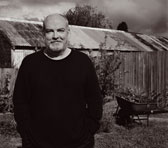5 October 2011
The Waltz Book revisited
 Image: Andrew Ford
Image: Andrew Ford © Jim Rolon
I've always envied Peter Sculthorpe the ability to arrange and rearrange his music. When you write a piece, you want it performed as much as possible. So if you can take a work for string orchestra, say, and arrange an element of it for cello and piano, then solo piano, then percussion quartet, then viol consort, then chamber orchestra, then string quartet, and then sit back while others arrange it for one guitar, two guitars and two percussionists (which is what Sculthorpe has done with Djilile), that is certainly what you should do. It makes total sense, gets the music played and heard by many more people, and I dearly wish I could do it too. But my own music seems resistant to arrangement, and my handful of attempts have not been particularly successful.
Still, the same impulse - to get the music played and heard as much as possible - lies behind my recent tinkering with The Waltz Book, the 60 one-minute waltzes I wrote for Ian Munro between 1998 and 2002. There is now a new revised score with lots of corrections and, in a few places, substantial rewriting - it's re-typeset, to boot, and far clearer than before - and there are also two slim volumes containing the simpler waltzes.
Ian Munro began playing these pieces as they (slowly) came off the construction line. I composed the first ('Waltz for Jasper') in 1998, and Ian played it at that year's Dartington Festival in the UK. This was before any of the other waltzes existed. Over the next few years I sent Ian the pieces as I finished them and, not being a pianist, I was keen to get his feedback. Lots of changes were made, and once Ian began playing the entire hour-long piece in 2003, he had further comments and suggestions, leading eventually to this new edition.
One of the aspects of The Waltz Book I like best is that alongside the big, barnstorming, virtuoso numbers are extremely simple pieces that might be played by Grade 2 or 3 students. (I like it, partly, because even I can manage a few of these.) Part of the drama of the work as a whole is those moments when, suddenly, music of great simplicity will follow on from pages of hectic activity. But it was pointed out to me that while these easier pieces might well be tackled by inexperienced pianists, people would be deterred if they had to buy a volume containing all sixty, most of which they wouldn't be able to play. So I've made two selections: 10 Easy Waltzes from The Waltz Book and 10 More Easy Waltzes from The Waltz Book.
It was always intended that individual waltzes could be played singly or in groupings of the performer's choosing, and this has happened gratifyingly often. Ian remains the only player I'm aware of to have performed the whole book, but among the pianists who have played some of the pieces are Simon Docking, Jenni Fleming, Piers Lane, Lisa Moore, Roger Smalley, Gerard Willems and Sally Whitwell. A relay performance of the entire piece (involving four players) occurred at a National Music Camp one year. And the piece has travelled abroad, too, to half a dozen different countries.
The most surprising performance I've heard was at the Kuhmo Festival in Finland when the Ukrainian pianist Vyacheslav Novikov took 25 minutes over his selection of 17 waltzes. Remember, these are meant to be minute-waltzes! But the piece lends itself to interpretation. The individual pieces last a minute on paper. In performance, it's different. Ian Munro's recent studio recording of the piece (on Tall Poppies) is pretty close to my timing, but it contains a few small discrepancies. For while I rewrote many of the waltzes at Ian's suggestion, in some cases he continued to play my original versions - or versions he himself had devised (with my blessing).
I regard the new score as definitive. Sort of. But the CD is definitive in a different way. It is the record of one of the most important, enjoyable and genuine collaborations of my life.
Further links
Andrew
Ford - AMC profile
The Waltz Book - AMC catalogue
10 Easy Waltzes from the Waltz Book
10 More Easy Waltzes from the Waltz Book
The Waltz Book - Ian Munro, piano (Tall Poppies CD)
© Australian Music Centre (2011) — Permission must be obtained from the AMC if you wish to reproduce this article either online or in print.
Subjects discussed by this article:
Andrew Ford is a composer, writer and broadcaster, and has won awards in all three capacities, including the prestigious Paul Lowin Prize for his song cycle, Learning to Howl. His music has been played throughout Australia and in more than 40 countries around the world.
Comments
Be the first to share add your thoughts and opinions in response to this article.
You must login to post a comment.